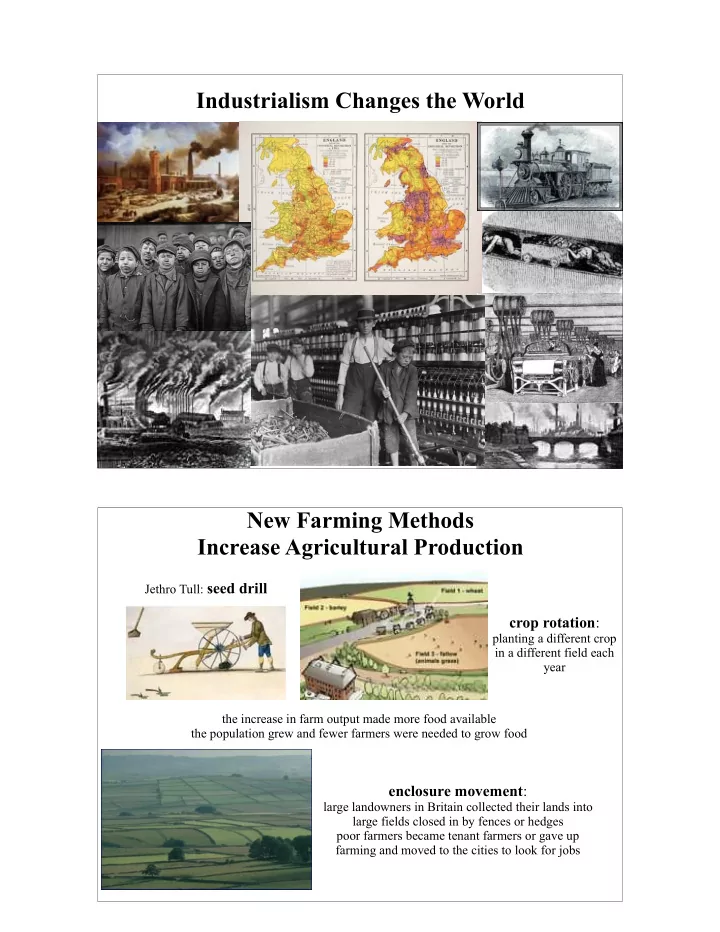

Industrialism Changes the World New Farming Methods Increase Agricultural Production Jethro Tull: seed drill crop rotation : planting a different crop in a different field each year the increase in farm output made more food available the population grew and fewer farmers were needed to grow food enclosure movement : large landowners in Britain collected their lands into large fields closed in by fences or hedges poor farmers became tenant farmers or gave up farming and moved to the cities to look for jobs
Industrialism Begins In Britain people had been making most goods by hand, often in their own homes ( cottage industry ) more and more goods were made by machines ! people began to make goods rather than produce food ! Great Britain had the resources needed for industrialization ! factors of production: land, labor (workers), and capital (wealth) Inventions In Textiles Spur Industrialization spinning jenny 1764: James Hargreaves water frame one large wheel and 1769: Richard Arkwright spindles onto which used waterpower to run spinning machines that made yarn thread was spun spinning mule 1779: Samuel Compton combined the moving carriage of the spinning jenny with the rollers of the water frame
Steam Power steam engine (1705) power loom 1787: Edmund Cartwright steam-powered version of a regular loom business owners built large factories to house and run these large and expensive machines steam-driven locomotive 1830: George Stephenson known as the “Father of Railways” steamboat helped business owners move their goods to market more quickly 1807: Robert Fulton created thousands of new jobs in several different industries (American) Industrialization Changes Life urbanization: the movement of people to and the creation of cities ! living conditions were bad in crowded cities limited housing, schools, or police protection lack of sanitation and rampant sickness working conditions were also bad many workers were killed or seriously injured in accidents wasn’t all bad: created jobs ! middle class began to grow in size ! produced better diets, better housing, and better clothing at lower prices
Continental Europe Industrializes Belgium the first country in mainland Europe to industrialize ! Germany the Ruhr Valley, rich in coal, eventually became a leading industrial region ! France industrial growth was aided by the government’s construction of a large network of railroads some countries, such as Austria- Hungary and Spain, faced transportation problems The Philosophy of Industrialization laissez faire economics government should not interfere with business capitalism economic system in which the factors of production are owned by individual people and companies Adam Smith: The Wealth of Nations (1776) argued that governments should not put limits on business Thomas Malthus: Principles of Political Economy Considered with a View to Their Practical Application (1820) proposed public works and private luxury investment as possible solutions for economic distress
Rise of Socialism utilitarianism the belief that a practice is good only if it is useful ! said the government should work to end great differences in wealth among people socialism the economic system in which the government owns and controls all the factors of production ! all people would enjoy the benefits of increased production Marxism Karl Marx - The Communist Manifesto (1848) a form of socialism in which factory owners and workers would struggle for power Reform Movements Labor Reforms ! union a group of workers negotiate contracts with their employers to determine their terms of employment, including pay, benefits, hours, etc. ! collective bargaining employees’ interests are commonly presented by union representatives to which the employees belong ! strike collective, organized, cessation or slowdown of work to force acceptance of their demands by the employer Abolition of Slavery ! the British Parliament ended the slave trade in 1807 and abolished slavery throughout British empire in 1833 ! Spain ended slavery in Puerto Rico in 1873 and in Cuba in 1886
Recommend
More recommend